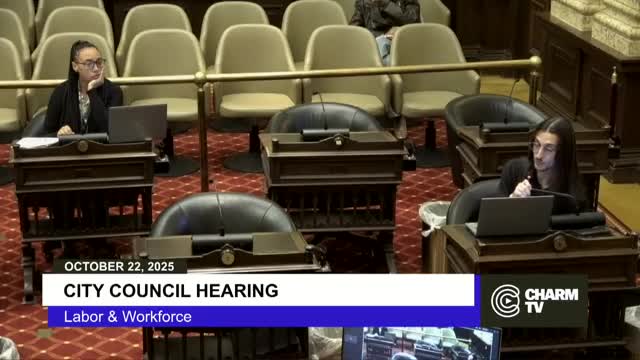Committee advances Baltimore bill requiring pregnancy accommodations for most employers
Get AI-powered insights, summaries, and transcripts
Subscribe
Summary
The Baltimore City Labor and Workforce Committee voted unanimously to recommend City Council Bill 25-0051, which would require employers of two or more workers to provide reasonable workplace accommodations for pregnancy and postpartum conditions and impose civil penalties enforced by the Community Relations Commission.
The Baltimore City Labor and Workforce Committee recommended favorably and sent City Council Bill 25-0051 — a local pregnancy-accommodations measure — to second reader after unanimous committee approval. The bill would require employers in Baltimore with two or more employees to provide reasonable accommodations on request for pregnancy, recovery from childbirth, or related conditions, prohibit adverse actions tied to such requests and establish civil penalties and enforcement procedures.
The bill’s sponsor, Councilman Paris Gray, told the committee the measure aims to prevent workers from having to choose between their health or childcare needs and keeping their jobs. “This bill is about protecting pregnant women, and new mothers in the workplace,” Gray said. He said the ordinance would require written pregnancy-accommodation policies and use civil citations, not criminal penalties, to encourage compliance.
Why it matters: the proposal lowers the employer-size threshold for accommodation obligations below state and federal levels. Department and agency witnesses told the committee the city-level law would extend protections to workers at smaller employers who are not covered by the federal Pregnant Workers Fairness Act or Maryland law.
Key provisions and amendments: The bill, introduced 04/07/2025 as City Council Bill 25-0051, would: - Require reasonable accommodations for pregnancy-related conditions upon request (examples discussed include additional breaks, modified schedules and light-duty assignments). - Apply to employers with two or more full-time employees (committee testimony contrasted this with federal and state thresholds of 15 employees). - Require employers to maintain a written pregnancy-accommodation policy and permit electronic distribution of that policy with confirmation of receipt. - Replace an introductory criminal misdemeanor penalty with a civil penalty structure; the sponsor’s amendment sets the penalty at $1,000 per violation and emphasizes civil citations and CRC enforcement.
The Law Department proposed two technical amendments and sought to remove a provision allowing employers to require broad documentation for accommodations, saying that the federal Pregnant Workers Fairness Act (PWFA) does not require documentation for all accommodations and that broad documentation requirements could impede access. Desiree Lucky of the Law Department described the changes as removing a “proof of necessity” provision and deleting a waiver provision tied to undue hardship so the accommodation process remains individualized.
The Office of Equity and Civil Rights (OECR) told the committee it supports the bill and the sponsor’s amendment replacing criminal penalties with civil fines. Zachary Wellman, equity policy analyst, told committee members OECR staffs the Community Relations Commission (CRC) with five investigators and one chief and said that staffing level would be adequate to handle any additional caseload tied to pregnancy-accommodation complaints. “The OECR supports the pregnancy accommodation protections established under City Council Bill 25-0051,” Wellman said.
The Baltimore City Health Department also urged a favorable report. “This bill strengthens and expands those rights,” Commissioner of Health Dr. Michelle Taylor said, noting the local ordinance would apply to smaller employers and to individuals who may not meet the disability definition used in some state protections.
Human Resources and implementation details: Russell Neverdon of the Department of Human Resources recommended specific language changes to align response timelines with existing ADA practice. The committee adopted an amendment changing the employer response period in the interactive process from five days to ten days, consistent with HR practice. The committee also adopted a DHR amendment permitting employers to distribute the required policy electronically provided a paper copy is available on request and the employer can verify receipt.
Enforcement and remedies: The committee adopted the sponsor’s amendment to make civil citations the primary enforcement tool and to set civil penalties rather than a misdemeanor for violations (the bill’s introductory form had proposed misdemeanor penalties). The Office of Equity and Civil Rights and Department of Finance supported civil penalties, and the law department approved the bill as to legal form after its amendments.
Committee actions and vote: The committee voted to adopt the sponsor’s and agency amendments, then voted by roll call to recommend the bill favorably with amendments. Chair Jermaine Jones, Councilman Ryan Dorsey, Councilman James Torrance and Councilwoman Felicia Porter voted yes; the motion passed and the bill will proceed to second reader.
Follow-up and next steps: Committee members directed staff to provide additional implementation materials. Councilman Ryan Dorsey asked DHR to send the city’s existing pregnancy-accommodation policy to the committee. Committee members also requested an implementation/status update from OECR (which oversees the CRC) roughly 30 days after the bill’s passage through council. OECR staff indicated they plan outreach and awareness efforts to inform workers and employers about the new protections.
Votes at a glance: City Council Bill 25-0051 — Labor and Employment — Pregnancy Accommodations — Committee recommendation to pass to second reader, roll call 4-0 (Jones, Dorsey, Torrance, Porter: yes).
